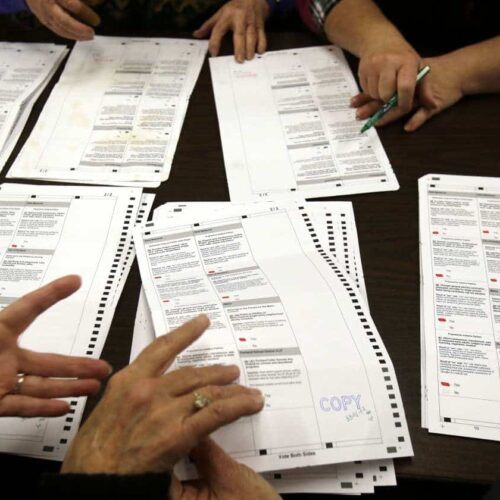This story was co-published with TIME.
Introduction
When corporations give money to get a ballot issue passed, the issue often affects their bottom lines.
A gambling company gives millions to allow the opening of a new casino; an agricultural giant spends huge sums to block mandatory labeling on genetically modified foods; or an electric company finances a measure to make it harder for municipalities to create their own power companies.
But occasionally, the corporate interest — and the shareholder interest — is a bit harder to identify.
In 2014, athletic-wear giant Nike Inc. put $50,000 toward an Oregon measure that would have eliminated separate party primaries in elections and $3,300 toward another issue that promised equal rights for women. In 2012, the company spent $5,000 to support gay marriage in a referendum in Washington, according to data from the National Institute on Money in State Politics.
The Center for Public Integrity reviewed 55 publicly traded companies and top corporate givers to ballot measures and found nine instances of curious positions — positions taken even when the companies’ policies emphasize their business interests as the overriding criteria in doling out political contributions.
The areas of interest were fairly diverse, but most seemed to focus on social issues or were aimed at fundamental changes to how state government operates.
“Companies spend this kind of money because it produces a return. Corporations are not irrational actors.”
Robert J. Shapiro, senior fellow, Georgetown Center for Business and Public Policy
Playing politics
When spending is aimed at playing politics, rather than business, it raises concerns with activists and shareholders, said Bruce Freed, president of the Center for Political Accountability, a nonprofit that advocates for transparency in corporate political spending.
“Companies need clear policies, and they need to follow those policies,” he said. “I think there is significant shareholder concern.”
What interest Nike had in the Oregon initiative on primaries remains a matter of speculation, as the company did not give a specific explanation when asked. A spokesman said the company gives based on “the merits of the ballot initiative, including the potential direct or indirect impact to our business.”
Nike policy states that political contributions are “to protect or enhance shareholder value.”
Corporate giving to politics has come under more scrutiny since the Supreme Court’s 2010 ruling on Citizens United v. Federal Election Commission opened the door for corporations and unions to spend more advocating for or against candidates.
But even before that ruling, business interests have been generous givers to ballot measure campaigns, unhampered by limitations since a 1978 Supreme Court ruling.
In 2014 alone, business interests accounted for more than three-quarters of the $266 million given by top donors to statewide ballot measures.
Courting decision-makers
Some of the contributions that don’t line up with company policy appear to be aimed at building corporate political clout in the states.
Companies are keen to make governors and legislatures as friendly as possible to business, according to Paul Kelly, a board member of the Association of Government Relations Professionals, which represents lobbyists.
Sometimes that means contributing to issues that control how those politicians are elected.
Exxon Mobil Corp. opposed public funding of political campaigns and stricter contribution limits in California in 2006.
Companies may also win friends by giving to ballot measures backed by powerful state leaders.
AT&T Inc. and Altria Group Inc., for example, gave to a pair of California government finance initiatives championed by Gov. Jerry Brown in 2014. In Maine, AT&T, Waste Management Inc. and Coca-Cola Co. were among more than a dozen companies that helped fight the repeal of a governor-backed school consolidation plan in 2009.
“That, too, can be an effective tactic,” Kelly said. “It goes on to some degree in order to be involved and help people that you have to work with.”
Coca-Cola’s policy says that it gives politically to benefit the “long-term, sustainable growth of our global beverage business.”
Coca-Cola spokesman Kent Landers said that the company opposed the Maine repeal measure because the company supports education. “Education is one of the keys to socioeconomic development in the communities in which we operate,” he wrote in an email.
Waste Management said the Maine school plan helped stabilize the state’s budget, which aided the company’s local business interests; Altria and Exxon Mobil did not say specifically how their contributions fit with their policies.
AT&T did not respond to requests for comment.
Major corporations have varying policies on whether and how they give to ballot measure campaigns. The Center for Public Integrity reviewed 55 publicly traded companies and top corporate givers to ballot measures and found nine companies that gave to ballot measures seemingly unrelated to their business interests, even when they had policies limiting such giving.
| Company | Industry | Policy wording | Unrelated giving | Company response |
|---|---|---|---|---|
| Altria Group Inc. | Tobacco | “Altria Group and its companies advocate on a wide range of public policy issues that affect our business.” |
|
“These are long-standing policies and procedures that guide our involvement in the political process.” |
| AT&T Inc. | Communications | Political contributions are for the good of “AT&T, our industry, and ultimately the free-market economy.” The company is politically involved for “the long-term interests of AT&T stockholders and employees.” |
|
No response. |
| Coca-Cola Co. | Food & Beverage | “We’re looking for long-term, sustainable growth of our global beverage business.” |
|
“Education is one of the keys to socioeconomic development in the communities in which we operate. Coca-Cola helps to create, build and encourage educational programs for students around the globe.” |
| Exxon Mobil Corp. | Oil & Gas | Political contributions may go to ballot measure campaigns that would have “an important impact on the business of the corporation.” |
|
“Our contributions to those ballot measures are consistent with our policy and enable us to communicate our positions on initiatives that are important to our company. We have a responsibility to our customers, employees, communities and shareholders to represent their interests in public policy discussions that impact our business.” |
| Nike Inc. | Athletic Wear | Nike allows giving that is “beneficial to the long-term business interests” of the company and that will “protect or enhance shareholder value.” |
|
“Political contributions by Nike Inc. are based on a number of factors including, but not limited to, the merits of the ballot initiative, including the potential direct or indirect impact to our business.” |
| Sempra Energy | Electric Utility | “Political contributions are made to candidates, political parties, Political Action Committees, and ballot measures in furtherance of public policies that support the company’s business interests.” — 2012 “Sempra participates in public policy debates on topics that affect our business, engaging with relevant industry groups and making contributions to political candidates, parties, and ballot measures as allowed by federal, state, and local law.” — 2009 |
|
“Political contributions are occasionally made to ballot measures to further public policies that support the company’s business interests, the industry and/or the communities in our service territories.” |
| Time Warner Cable Inc. | Communications | “The Company does not use corporate funds to support or oppose ballot measures, except in those instances where the proposed measure will have a direct and material impact on the Company.” |
|
“Like many other businesses across the state, we felt that without a dramatic response, historic drought could seriously affect vital aspects of our business: residential and business customer growth, as people left the state or had less money to spend; the cost of energy and other costs of serving our customers; and our ability to attract and retain outstanding talent in our local workforce.” |
| Waste Management Inc. | Waste Disposal | “All political contributions are to promote the business interests of the company.” |
|
“The 2009 ballot initiative in Maine was one we engaged in, as we believed that a stable and predictable budgeting process at the state level was something that aligned with our local business interests.” |
| Wells Fargo & Co. | Banking | “Wells Fargo participates in state and local ballot measures … that impact our various lines of business.” |
|
“We have no comment.” |
Source: Corporate websites, U.S. Securities and Exchange Commission filings, National Institute on Money in State Politics
Risk or reward?
Experts are divided over whether using contributions to create political allies can actually help a company’s bottom line. Robert J. Shapiro, a senior fellow at the Georgetown Center for Business and Public Policy who has written on this issue, said corporate political activity generally boosts business.
“Companies spend this kind of money because it produces a return,” he said. “Corporations are not irrational actors.”
Not all shareholders agree. Critics of corporate political giving warn of risks to a company’s reputation, citing protests outside retailing giant Target Corp.’s doors in 2010 after the company gave to a pro-business political action committee that backed a candidate who opposed gay marriage.
Since 2014, shareholders have sponsored at least 58 proposals about political spending at annual meetings of Fortune 250 companies, according to an analysis of the Proxy Monitor database, which is sponsored by the Manhattan Institute’s Center for Legal Policy. None passed.
Zevin Asset Management, a Boston firm that calls itself a pioneer in socially responsible investing, helped craft one unsuccessful shareholder resolution in 2013 that asked Exxon Mobil to study whether it should stop political giving.
“We still think there’s reason for concern and risk to shareholder value by companies using funds to influence elections,” said Zevin President Sonia Kowal. “The returns are unclear.”
All or nothing
Some public companies, such as Accenture PLC, make it a policy not to give to ballot measures.
Still others give widely with no concrete policies or explanations — Wal-Mart Stores Inc., for example, gave at least $100,000 to support the 2014 California government finance measures but has said in documents that sharing the “business rationale” behind political contributions “would place our company at a competitive disadvantage by revealing our long-term business strategies.”
Other firms have policies explicitly saying they give to a wide range of ballot measures as a form of community involvement. These broader policies are intended to benefit not just stockholders but “stakeholders,” including employees, customers and more.
Microsoft Corp. has a global public policy agenda that takes stances on the environment, education and other issues. In 2012, it gave $99,500 to support gay marriage in its home state of Washington and earlier this year published a blog post defending its contribution.
“Diversity and inclusion help drive our business and our bottom line,” the company wrote. “Our customers literally are as diverse as the people of the world. To create technology that empowers the world, we need a workforce that reflects the diversity of the world.”


Join the conversation
Show Comments